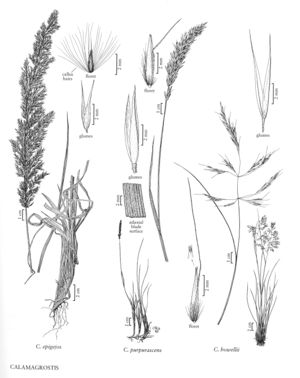Difference between revisions of "Calamagrostis howellii"
imported>Volume Importer |
imported>Volume Importer |
||
| (One intermediate revision by the same user not shown) | |||
| Line 43: | Line 43: | ||
|publication year= | |publication year= | ||
|special status=Endemic | |special status=Endemic | ||
| − | |source xml=https:// | + | |source xml=https://bitbucket.org/aafc-mbb/fna-data-curation/src/200273ad09963decb8fc72550212de541d86569d/coarse_grained_fna_xml/V24/V24_1004.xml |
|subfamily=Poaceae subfam. Pooideae | |subfamily=Poaceae subfam. Pooideae | ||
|tribe=Poaceae tribe Poeae | |tribe=Poaceae tribe Poeae | ||
Latest revision as of 16:21, 11 May 2021
Plants sometimes with sterile culms; usually densely cespitose, occasionally with rhizomes shorter than 1 cm. Culms (25)35^45(60) cm, unbranched, smooth or slightly scabrous beneath the panicles; nodes 1-2. Sheaths and collars smooth; ligules (2.5)3.5-6 mm, acute, lacerate; blades (9)12-20(25) cm long, 1-2.5(3) mm wide, flat to involute, abaxial surfaces smooth, adaxial surfaces finely scabrous, glabrous or sparsely hairy. Panicles (5)7-12(15) cm long, (2)3.5-6.5(8) cm wide, loose, open, straw-colored or green to purplish; branches (2)3.5-5(7) cm, smooth or sparsely scabrous, spikelets usually confined to the distal 1/2. Spikelets (5.5)6-8 mm; rachilla prolongations 1-1.5(2) mm, hairs (1.5)2-2.5(3) mm. Glumes rounded to slightly keeled, smooth or scabrous distally, lateral veins usually prominent and raised, apices acuminate; callus hairs 2-3(4.5) mm, 0.4-0.6(0.7) times as long as the lemmas, abundant; lemmas 4.5-5 mm, about 2 mm shorter than the glumes; awns (10)13-16 mm, attached to the lower 1/5 – 2/5 of the lemmas, exserted, stout, easily distinguished from the callus hairs, strongly bent; anthers (2)2.5-3(4) mm. 2n = 28.
Discussion
Calamagrostis howellii grows on dry rocky slopes, banks, ledges, and in cliff crevices, sometimes on basalt, from 100-500 m. It grows only in the Columbia River Gorge of Washington and Oregon.
Selected References
None.
